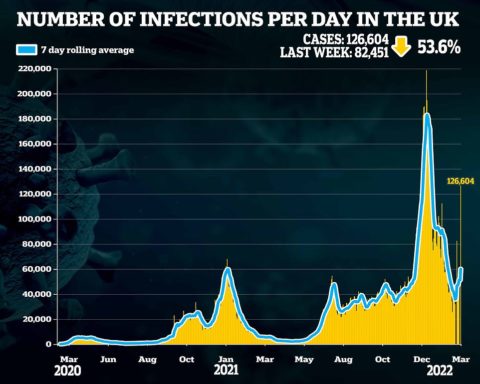A University of Oxford-led study has found people who have had coronavirus are reporting neurological and mental health problems despite, in many cases, not ever having experienced them before. While psychological illnesses such as anxiety or depression can appear after other viral infections, the study suggested those who sick with COVID-19 were twice as likely to develop them compared to people who contracted the common flu.
Dr Sue Varma told CBS This Morning: “We are seeing that 13 percent of people who have never had psychiatric illnesses before, neological problems before are getting this for the first time.
“We are seeing anxiety being the most common, followed by depression, followed by insomnia, substance abuse and in very rare cases even psychosis.
She added: “The people who are most at risk are the ones who were the sickest, the hospitalized patients the ones who were in the ICU.
“Those are the ones who are more at risk from the more serious conditions that we talked about the strokes and the dementia and the delirium which is the waxing and waning of consciousness.”
The psychiatrist continued: “But the scariest part is people who didn’t even have either Covid symptoms or very mild Covid symptoms that resolved or prior psychiatric known illness they too are at risk for the anxiety or the depression.
“You know it is hard to be able to tease apart is it because of the hospitalization and just the fear and the economic impact and all the layers of the pandemic.
“Or was there something also medical going on and that is what this study picked up, that there was something medical going on in the brain.
Dr Varma added: “That is so scary especially if you are hearing voices or the voices are telling you to harm yourself or harm other people or other people are out to get you.”
The study, which looked at mostly American patients, found that among patients treated in the ICU, 7 percent suffered a stroke and nearly 2 percent were diagnosed with dementia.
Researchers also found 17 percent of patients developed anxiety, and 14% experienced mood disorders.
Study leader Professor Paul Harrison, of the University of Oxford, said: “This is real-world data from a large number of patients.
“They confirm the high rates of psychiatric diagnoses after Covid-19, and show that serious disorders affecting the nervous system (such as stroke and dementia) occur too.
DON’T MISS
Statins: Statins may increae risk of health conditions [TIPS]
Diabetes type 2: Warning signs in your feet [INSIGHT]
Cancer symptoms: Signs it is multiplying in bowel [ADVICE]
“While the latter are much rarer, they are significant, especially in those who had severe Covid-19.”
Dr Richard Francis, head of research at the Stroke Association, said the findings were “concerning”.
He said: “Risk of having a stroke with Covid-19 is low, but higher than other infections.
“The study finds that compared to people that had an influenza infection, infection with Covid-19 has a 62 percent higher risk of stroke caused by blood clots (ischaemic), and 71 percent higher risk of stroke caused by a bleed in the brain (intracranial haemorrhage).”
Prof Harrison suggested the NHS may need to prepare for an increase in demand on services for such conditions.




